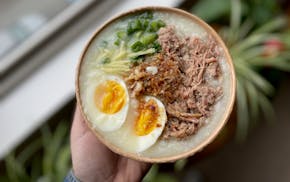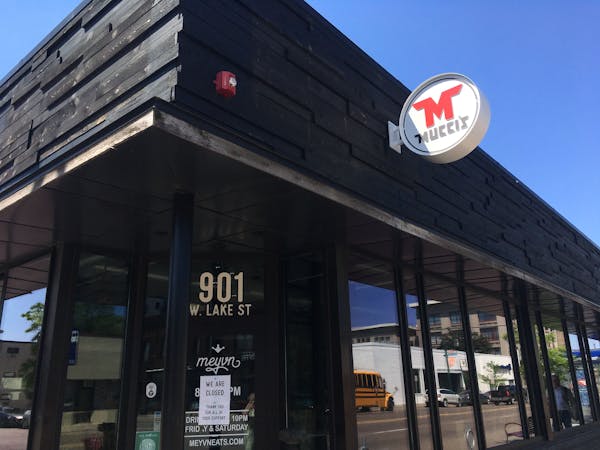Sunlight streamed through stained-glass windows on an unseasonably warm fall day, lighting up the Williamsburg Room, a stately wood-paneled dining room at the Lexington, with a ghostly glow.
The room, with its grand piano, wood-burning fireplace and secret doors, was a popular spot for hosting wakes during the Lexington's long history on Grand Avenue in St. Paul. Over more than 80 years, that's a lot of dead bodies.
Dawn McClain roamed through the restaurant, holding an electromagnetic field detector, a gray TV remote-sized device that picks up invisible waves of radiation. When she entered the Williamsburg Room, little lights on the device that had been flickering between green and yellow — for no detection and some detection — suddenly flashed adamantly red.
McClain, a radio producer and an investigator with the 11-member Twin Cities Paranormal Society, had used her ghost-hunting equipment here on three overnight investigations — an endeavor that involves moving through the restaurant's many rooms with ghost-detecting equipment that picks up changes in electronic fields, sudden temperature drops, even voices.
But the Lexington's spirits don't wait until nightfall to make their presence known.
While the restaurant has revealed itself to be a hotbed of paranormal activity — which the society will detail in sold-out presentations on Oct. 29 and 30 — it's not the only Twin Cities eatery that has had odd or unexplainable phenomena pointing to the possible presence of otherworldly energies.
"A restaurant is a highly active place," McClain said. "When you think about how hard it is to keep a restaurant open — people have these dreams, but as we all know, it's extremely difficult, and the staff put their heart and soul into things. There are frustrations, there are fights. Experiences like that build up over time and leave behind trails."
Restaurants in older buildings tend to be the first to get labeled as haunted, whether that means sightings of figures in vintage clothes, unexplained lights going on and off, or just a creepy feeling that staffers get when they go into the basement.
"It's historical," said Brady Jeunesse, another paranormal society member, who has conducted investigations of Minneapolis mainstays Black Forest Inn and the American Swedish Institute as well as the Palmer House Hotel in Sauk Centre and the now-closed Forepaugh's, a famously haunted restaurant in a St. Paul mansion with a thorny history.
"The wood, the stone, especially limestone, absorbs the historical energy, and that's why we have residual hauntings where we're just picking up a broken record back in time," Jeunesse said.
Stirring up the past
There are other reasons why dining establishments might become playgrounds for the nonliving, and it's not just because someone died there. Frequent renovations can supposedly stir up energy. Abusive work environments might have caused some departed staffers to linger, or, on the other hand, a restaurant could have been a happy place for employees who don't want to leave.
And the sheer number of customers who come through the doors of a restaurant bring their own personal dramas with them. They can leave great joy or deep sadness behind.
"Think about how many times people have had breakups at a restaurant because they don't want to do it at home," McClain said.
So while there are claims that many places in Minnesota are haunted, restaurants in particular seem to attract lost spirits. Or, at the very least, believers.
"Our industry is super-susceptible to the things that happen when there's a full moon, to the things that happen during Mercury in retrograde," said restaurateur Tim Niver. "Things fall, things break more, people are wound up. Energy is undeniable."
Some buildings that have seen a high turnover of failing food businesses can get stuck with the stigma of being "cursed." Niver has firsthand experience with that. After his short-lived Lake Street restaurant Meyvn closed, he said he wanted to clear "a dense air, a disruptive, unsettling feeling" that he often felt in the space. It was nothing "crazy or weird," no apparitions or strange noises. But the business had been struggling, he was stressed out, and he wondered if things could feel better, easier, lighter.
Before reopening in 2019 with another concept, Trattoria Mucci, he hired Great Tree Healing to conduct a "clearing" of negative energy. (The experience was detailed in a memorable essay in Mpls.St.Paul magazine.)
"Tim called and said, 'I need your help.' It was literally like a 'Ghostbusters' call," said Denise Obermeyer, a clairvoyant and the owner of Great Tree Healing in Roseville.
It turned out that the basement had a portal through which spirits, or "in-betweeners," moved freely, she said. Her colleague Rick Schuster handles the clearings by speaking to the energy that's stuck there, asking it to move on, and neutralizing it with newer, positive energy.
"We consider it a rebalancing," Obermeyer said.
Paul Hyde, a real estate developer, asked Great Tree Healing to do a clearing in one of his buildings. A former steam laundry in Minneapolis' North Loop that dates back to the 1920s is now the home of Billy Sushi.
On a walk-through, Schuster explained something that had perplexed the chef, Billy Tserenbat, Hyde said. At least once a week, a glass would fall from the bar and break, seemingly out of nowhere. Legend has it that a ghost bartender from long ago was still there and still working, however sloppily.
Hyde wasn't sure what to believe, he said, until he went into a basement mechanical room and witnessed orbs of light zooming around when the healer closed a so-called portal. He's thinking about doing clearings in his other buildings now.
"I'm a very down-to-earth real estate person, but I think the universe is much bigger than we can imagine," Hyde said. "I don't know if I'm convinced that this is real, but if there's a chance it makes the space safer and better for our tenants and their customers, then it's worth checking out."
Hyde said Billy Sushi feels "lighter" since the clearing. "You don't feel as creeped out now," he said.
A skeptic no more
Things were going better in Uptown at Trattoria Mucci, too. "And then COVID happened," Niver said. "And more than COVID happening, Winston Smith and George Floyd happens, and the amount of sad, angry energy that was literally stomped into the streets is still palpable by everybody there, and by everybody who doesn't go there."
Niver brought Schuster back to the restaurant for another session, he said. Having started the process as a self-proclaimed "East Coast skeptic," Niver says he's coming around to the idea that there are unseen forces at play in the hospitality business.
"Maybe I'm even more open now," he said. "Because during a time of crisis, if you're not in your fetal ball, you're maybe looking into the crystal ball, trying to figure out what the hell is going on."
A lot of businesses aren't willing to share this kind of information with customers. Many clients make investigators or healers sign confidentiality agreements, thinking it might be bad for business.
Not so at the Lexington, home to spooky stories about children running around in the ballroom, a prostitute skulking in the basement, a storage room full of antiques with all sorts of strange energy attached to them, a telephone with an unpublished number that rings —and an old cook who hangs out in that grand and ghostly Williamsburg Room, setting off phantom detectors.
"It's part of the history of the building, and I can't undo that," said general manager Craig Ritacco, who welcomes believers and skeptics alike to experience the ghost stories for themselves. "As long as the building is standing, that will continue."
'There's Still Tomorrow' director Paola Cortellesi talks success, toxic relationships and hope

